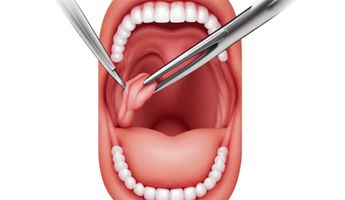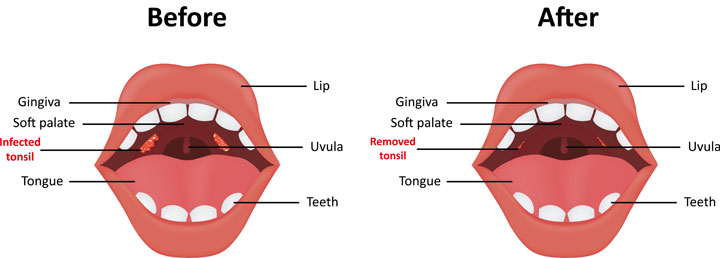Tonsillectomy in Hamburg
Search and Compare the Best Clinics and Doctors at the Lowest Prices for Tonsillectomy in Hamburg

Find the best clinics for Tonsillectomy in Hamburg
With Medijump you can browse 1 facilities offering Tonsillectomy procedures in Hamburg. The cheapest price available is $2,506 in Munich
Tonsillectomy in Germany
Price: $ 2,506
Tonsillectomy in Munich
Price: $ 2,506
Tonsillectomy in Berlin
Price: $ 2,973
Morocco offers the best prices Worldwide
Price: $ 308
University Medical Center Hamburg-Eppendorf, located in Eppendorf, Hamburg, Germany offers patients Tonsillectomy procedures among its total of 288 available procedures, across 30 different specialties. Currently, there's no pricing information for Tonsillectomy procedures at University Medical Center Hamburg-Eppendorf, as all prices are available on request only, whilst the national average price is approximately ฿98,600. There is currently a lack of information available on the specialists practicing at the Clinic, and they are accredited by ISO 9001:2008
WHY US?
At Medijump, we're making medical easy. You can search, compare, discuss, and book your medical all in one place. We open the door to the best medical providers worldwide, saving you time and energy along the way, and it's all for FREE, no hidden fees, and no price markups guaranteed. So what are you waiting for?

Free

Best Price

Widest Selection

Risk-Free
What you need to know about Tonsillectomy in Hamburg

Tonsillectomy is a surgical procedure to remove the tonsils – the two oval-shaped pads of tissue located at the back of the throat. The procedure is usually performed to treat recurring or chronic inflammation and infection of the tonsils (known as tonsillitis), but it can also be done to treat breathing problems related to swollen tonsils, sleep apnea, cancer of the tonsils, bleeding of the tonsils, as well as frequent and loud snoring.
What does a Tonsillectomy Procedure Involve?
Tonsillectomy is performed under general anesthetic, so you will not feel any pain during the surgery. There are two ways to perform a tonsillectomy. The most common way is to use a blade or scalpel to cut out the tonsils. The other way is to use a specialized surgical tool that uses soundwaves, or high-powered energy heat to destroy or remove the tissues and stop any bleeding.
How Long Should I Stay in Hamburg for a Tonsillectomy Procedure?
Unless there is a complication that occurs after the surgery, you should be able to leave the hospital on the same day. However, plan to stay in Hamburg for about 5 to 10 days for initial recovery and follow-up hospital checkups as your surgeon will monitor the healing progress.
What's the Recovery Time for Tonsillectomy Procedures in Hamburg?
The total recovery period can take about two weeks, but most people are able to go back to work or school and resume most of their normal routine within 5-7 days. Avoid any strenuous activities, such as intense exercise and heavy lifting for a few weeks following the surgery to avoid any complications. Your surgeon will give you a detailed recovery timeline for you.
What sort of Aftercare is Required for Tonsillectomy Procedures in Hamburg?
Make sure to take pain medications as prescribed by your surgeon and drink plenty of water to avoid dehydration. You may need to avoid hard, crunchy, acidic, or spicy foods for a while, and your surgeon may give you a dietary plan. Talk to your surgeon about any activities that you need to avoid to prevent tonsillitis from recurring.
What's the Success Rate of Tonsillectomy Procedures in Hamburg?
Tonsillectomy is generally safe and highly successful. The morbidity rates of the procedure range from 1.5% to 1.4%. However, like other types of surgeries, there are side effects and risks that you should not overlook, including swelling, bleeding during healing, bleeding during surgery, reactions to anesthetics, infection, and sore throat.
Are there Alternatives to Tonsillectomy Procedures in Hamburg?
In some cases, tonsillitis that is not severe and only happened once does not need a tonsillectomy. For other conditions, your alternative depends on the disease you used the procedure for. For instance, if you have sleep apnea, your doctor may suggest you undergo nasal surgery, tongue surgery, or bone surgery. If you need to undergo the procedure because of cancer, your doctor may recommend chemotherapy, immunotherapy, and radiation therapy.
What Should You Expect Before and After the Procedure
Having a problem in your tonsils can be uncomfortable, causes painful symptoms, and it can also lead to other dangerous complications. After the procedure, all of your symptoms should be relieved and your risk of dangerous complications is significantly reduced.
Whilst the information presented here has been accurately sourced and verified by a medical professional for its accuracy, it is still advised to consult with your doctor before pursuing a medical treatment at one of the listed medical providers
No Time?
Tell us what you're looking for and we'll reachout to the top clinics all at once
Enquire Now

Popular Procedures in Hamburg
Prices Start From $8,031

Prices Start From $404

Prices Start From $18

Recommended Medical Centers in Hamburg for Tonsillectomy

- Interpreter services
- Translation service
- Religious facilities
- Medical records transfer
- Medical travel insurance
- Health insurance coordination
- TV in the room
- Safe in the room
- Phone in the room
- Private rooms for patients available

- Interpreter services
- Translation service
- Religious facilities
- Medical records transfer
- Medical travel insurance
- Health insurance coordination
- TV in the room
- Safe in the room
- Phone in the room
- Private rooms for patients available

- Interpreter services
- Translation service
- Religious facilities
- Medical records transfer
- Medical travel insurance
- Health insurance coordination
- TV in the room
- Safe in the room
- Phone in the room
- Private rooms for patients available

- Interpreter services
- Translation service
- Religious facilities
- Medical records transfer
- Medical travel insurance
- Health insurance coordination
- TV in the room
- Safe in the room
- Phone in the room
- Private rooms for patients available

- Interpreter services
- Translation service
- Religious facilities
- Medical records transfer
- Medical travel insurance
- Health insurance coordination
- TV in the room
- Safe in the room
- Phone in the room
- Private rooms for patients available

- Interpreter services
- Translation service
- Religious facilities
- Medical records transfer
- Medical travel insurance
- Health insurance coordination
- TV in the room
- Safe in the room
- Phone in the room
- Private rooms for patients available

- Interpreter services
- Translation service
- Religious facilities
- Medical records transfer
- Medical travel insurance
- Health insurance coordination
- TV in the room
- Safe in the room
- Phone in the room
- Private rooms for patients available

- Interpreter services
- Translation service
- Religious facilities
- Medical records transfer
- Medical travel insurance
- Health insurance coordination
- TV in the room
- Safe in the room
- Phone in the room
- Private rooms for patients available

- Interpreter services
- Translation service
- Religious facilities
- Medical records transfer
- Medical travel insurance
- Health insurance coordination
- TV in the room
- Safe in the room
- Phone in the room
- Private rooms for patients available

- Interpreter services
- Translation service
- Religious facilities
- Medical records transfer
- Medical travel insurance
- Health insurance coordination
- TV in the room
- Safe in the room
- Phone in the room
- Private rooms for patients available
Tonsillectomy in and around Hamburg
About Hamburg
Hamburg is the second-largest city in Germany. It is a port city and it is also the second-busiest port in Europe. Famous for its parks and canals, this eclectic city is filled with iconic architecture, delicious cuisines, music, and lively nightlife. Hamburg also enjoys an excellent reputation in the field of medical tourism. The hospitals in the city boast highly-trained specialists offering remarkable standards of medical care. From prevention and diagnosis to treatment and aftercare, medical tourists are sure to receive the best care. Numerous hospitals and clinics provide the highest standard of healthcare as well as world-class medical care around the clock. Cutting-edge hospitals, experienced specialists, and advanced techniques in line with the very latest scientific findings are the reason why its healthcare sector is thriving.
Popular Parts of Hamburg
As a port city, much of the city’s character comes for its port, which is why the harbor tour is very popular. The harbor tour allows visitors to admire the city from a different perspective. Those who love art should visit Hamburger Kunsthalle, which is the city’s premier art gallery offering a wide collection of Germany’s master painters. Any visitor who loves shopping should go to Altona, an elegant neighborhood where visitors can find an array of stylish boutiques, amazing restaurants, and bars. Hamburg is also known as one of the nightlife capitals of Europe. The center of the city’s nightlife is located in St. Pauli, a neighborhood filled with live music venues, dance parties, pubs, and cocktail bars.
Transport in Hamburg
Hamburg Airport is the international airport in Hamburg, which connects the city with numerous countries in Europe and the Middle East. Public transportation in Hamburg is efficient and convenient. Buses operate around the clock, including a special night bus (Nachtbus) service. The U-Bahn and S-Bahn trains are integrated, making it easy to get around the city. Visitors who want to get around with the U-Bahn and S-Bahn train can buy an individual ticket or an All-Day ticket, which is reasonably priced. Taxis are easily available and are reliable.
Visas in Hamburg
Since Germany is part of the Schengen Area, citizens of several countries, such as Australia, Canada, and the US, can visit and stay in the country without a visa for up to 90 days. Citizens of other countries are required to apply and obtain a visa prior to their arrival. It is recommended to always check the requirements for the visa application before applying.
Weather in Hamburg
Summer, starting from June to August, has an average temperature of 24°C, making it a popular time to visit the city. However, the temperatures can rise to 30°C on some very hot days. Winter can be very cold, with the temperatures dropping below 0°C. The seasons of spring (March-May) and autumn (September – October) has pleasant weather with warm temperatures.
Additional Info
- Local Currency: The local currency is the Euro (EUR). 1 EUR converts to approx. 1.12 USD.
- Money & Payments: ATMs are widespread around the city. Credit cards are widely accepted and tipping is common.
- Local Language: German is the official language. Most people, particularly in tourist areas, will speak little English.
- Local Culture and Religion: The largest religion is Christianity and Islam is the second-largest religion. Judaism, Buddhism, and Hinduism are also freely-practiced.
- Public Holidays: Some of the most celebrated public holidays are New Year’s Day, Day of German Unity, Reformation Day, and Christmas Day.
Popular Searches
- Plastic Surgery in Thailand
- Dental Implants in Thailand
- Hair Transplant in Thailand
- Breast Augmentation Thailand
- Gastric Sleeve in Thailand
- Gender Reassignment Surgery in Thailand
- Laser Hair Removal in Bangkok
- Botox in Bangkok
- Dermatology in Bangkok
- Breast Augmentation in Bangkok
- Coolsculpting in Bangkok
- Veneers in Turkey
- Hair Transplant in Turkey
- Rhinoplasty in Turkey
- Stem Cell Therapy in Mexico
- Rhinoplasty in Mexico
- Liposuction in Mexico
- Coolsculpting in Tijuana
- Rhinoplasty in Korea
- Scar Removal in Korea
- Gastric Sleeve in Turkey
- Bone Marrow Transplant in India
- Invisalign in Malaysia
- Plastic Surgery in the Dominican Republic
- Tummy Tuck in the Dominican Republic
- Plastic and Cosmetic Surgery in Poland
- Rhinoplasty in Poland
- Hair Implant in Poland
- Dental Implants in Poland
- IVF in Turkey
